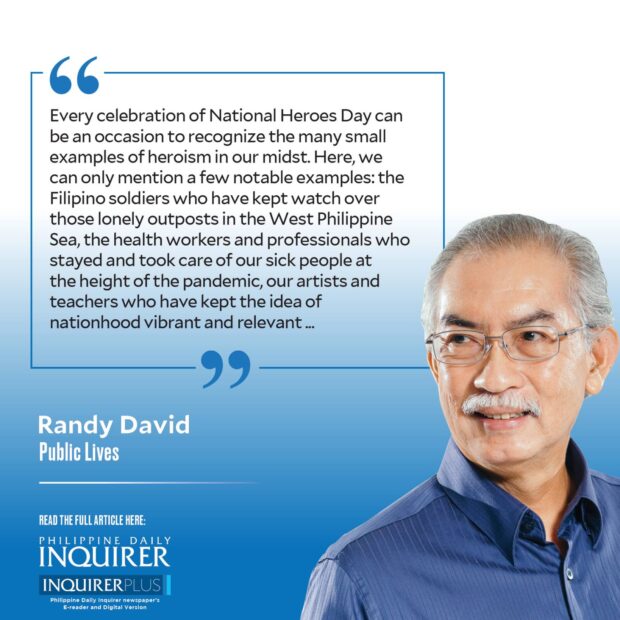Heroes as teachers of national purpose
Though they may come from different social classes and ranks, a nation’s heroes are different from the average citizen in that they tend to be driven by a singular instinct—to promote the survival and flourishing of the people that constitute the nation. In doing so, heroes relegate their personal lives and careers, their own advancement, and pleasures, to secondary importance. Sometimes this quality may express itself as reason, sometimes as pure unadulterated passion, or folly, but beneath it always is a stubborn instinct to loosen the grip of the old way of life and bring about a different form of existence.
By their words and their actions, and, best of all, by the example of their lives, a nation’s heroes are, first and foremost, teachers of the purpose of a nation’s reason for being. They may be mocked for their ambition, their naiveté, and brashness. But their persistence, borne of belief in a purpose larger than themselves and fortified by their essential trust in the value of life, always achieves something new, even if this may not be fully grasped at the time.
Article continues after this advertisementSuch were the greatest teachers of Filipino national purpose—Jose Rizal, Andres Bonifacio, and Apolinario Mabini. And, from more recent times, such was Ninoy Aquino. Though their methods differed, they were one in believing that the emancipation of the Filipino nation from the shackles of foreign domination, domestic tyranny, illiteracy, and chronic poverty, was worth living and dying for.
This basic belief or faith in the Filipino, as we all know, has never been easy to maintain or justify. For, in our daily lives, we usually find ourselves under the spell of a perspective that, in the words of Friedrich Nietzsche, “makes what is closest at hand and most vulgar appear as if it were vast, and reality itself.” We all too easily give up hope in the face of the seemingly unredeemable habits of our people, particularly during elections, when they unthinkingly exchange their votes for cash or blindly put their trust in demagogues who trade on their resentments.
Redemption is not possible when we magnify the flaws and fail to appreciate the heroism that even individuals in ordinary circumstances are capable of. It seems trite to say that there are no perfect heroes, but it is a fact that many of our heroes suffered from certain weaknesses of character. Bonifacio was regarded as hotheaded and impulsive. Rizal was known to be extremely sensitive to implied slights in his leadership. Mabini was seen as scheming in his role as chief adviser to Emilio Aguinaldo. And, in our time, perhaps no politician was more reviled for his ambition and star complex, and praised for his eloquence, courage, and martyrdom than Ninoy Aquino.
Article continues after this advertisementNone of these flaws ought to diminish their role and value as teachers of national purpose. But the making of heroes must itself be a purposive act. It has to be treated as an art, requiring, as Nietzsche puts it, distance and a fair amount of staging in order to create “simplified and transfigured” images. “Only in this way can we deal with some base details in ourselves.”In this passage, the German philosopher was, in fact, not talking of the “staging” of heroism as it applies to individual figures. He was referring to the equally important need to project ordinary people themselves as capable of heroism in their everyday lives, and therefore worthy of the sacrifices made by their heroes.
I can only suppose that this is what has been lacking in our official celebrations of the lives of our national heroes. We are not made to remember exactly what it is they aspired to attain for the Filipino people. Nor are we encouraged to measure ourselves in the light of these aspirations. Every year, the remoteness of our heroes only increases—as our country finds itself even more mired in corruption and incompetent leadership, demoralization, economic decline, growing inequality, and deterioration in education and civic values.But, for sure, this is not the only narrative we can tell ourselves. Every celebration of National Heroes Day can be an occasion to recognize the many small examples of heroism in our midst. Here, we can only mention a few notable examples: the Filipino soldiers who have kept watch over those lonely outposts in the West Philippine Sea, the health workers and professionals who stayed and took care of our sick people at the height of the pandemic, our artists and teachers who have kept the idea of nationhood vibrant and relevant, our civil servants who serve with dedication and resist corruption, our lawyers and activists who continue the fight against tyranny, entrepreneurs who build on local talent and Filipino creativity, and volunteer organizations that empower communities, give hope, and quietly serve the common good.
Clearly, I don’t have in mind creating more award-giving bodies. Recognition can come in many forms, but, whenever it is given in conjunction with National Heroes Day, its primary purpose must be to enhance pride in being Filipino.
—————-
public.lives@gmail.com

















